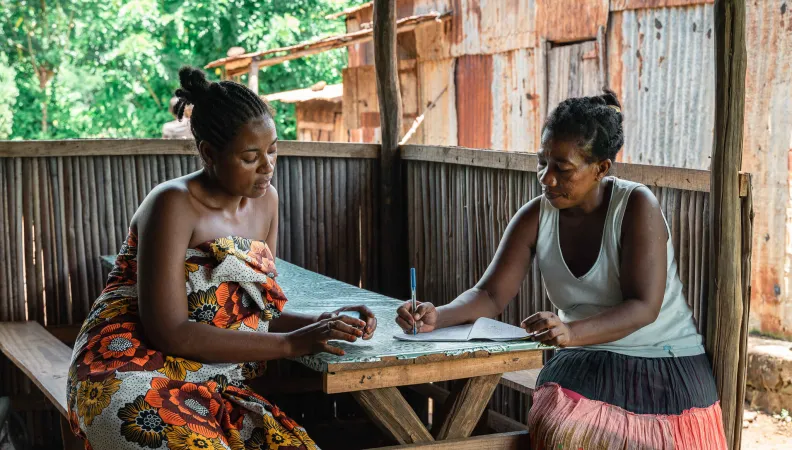Share the page
Lumin’îles
Project
Published on

-
Project start date
-
Status
Ongoing
-
Project end date
-
-
Financing amount (Euro)
-
10m
-
Country and region
-
Comoros, Mauritius, Madagascar, Africa
The project aims to support women’s economic empowerment in the Indian Ocean region, by focusing on promoting and rallying around issues related to childcare, formalising this sector, and improving working conditions for women in companies.
Gender inequalities in access to employment in the Indian Ocean
Despite the differences in national situations, the Comoros, Madagascar and Mauritius share the same reality of gender inequalities in access to economic opportunities. Indeed, women face many barriers in these three countries:
- Limited access to public services: childcare, healthcare, protection against gender-based violence
- Sometimes discriminatory laws and policies
- Restrictive social norms
- A disproportionate burden of unpaid household chores
In this region, childcare services for under six-year-olds remain very limited. They are often of poor quality and are mainly provided by the private sector, meaning that they are not affordable, especially for low-income families.
Public commitments towards early childhood education are improving, but the fact that there is no explicit recognition in international frameworks hinders large-scale and coordinated mobilisation efforts. In addition, social norms, which often favour childcare within the family circle, influence practices and can frequently inhibit the use of existing childcare facilities.
Promoting childcare arrangements
In these three Indian Ocean countries, as in most parts of the world, women primarily shoulder the responsibility of caring for young children and dependents, which restricts their economic empowerment. This unequal distribution of responsibilities, which is as yet insufficiently documented, prevents mothers from accessing the labour market, especially as there is a lack of accessible and suitable childcare arrangements.
The services available are often only accessible for better-off households, or are in the informal sector, and are mostly handled by women. The lack of extra-curricular arrangements (canteens, nurseries, suitable opening hours) poses further constraints for women.
To support the empowerment of these women, the first component of the Lumin’îles project aims to develop affordable childcare services integrated in the formal sector.
It also involves collecting gender-based data on the time devoted to care and childcare needs, strengthening advocacy concerning the first 1,000 days of a child’s life, supporting public policies (standards, quality), and testing solutions geared towards local situations.
Characterising, organising and formalising the childcare services sector
Women working in the care sector, especially for childcare, predominantly do so informally and without fully benefiting from the rights associated with declared work. They are often isolated, non-unionised, or not collectively organised to defend their interests.
To address this situation, the project’s second line of action aims to structure the care sector by formalising and training the women and men who work in the childcare sector. It will promote the creation of collectives or unions to empower them and thereby permanently enhance the status of care activities. This will also involve strengthening the unions in place specialised in this sector, or creating dedicated branches in more broad-based unions. Furthermore, the project will assist entrepreneurs in the sector by strengthening support structures for women’s entrepreneurship.
In addition, to avoid perpetuating gender stereotypes, special attention will be given to also attracting men to the jobs and training developed in the care sector.
Improving working conditions for women
The project’s third line of action will aim to foster collaboration between governments and employers in the Comoros, Madagascar and Mauritius to turn childcare into a driver for economic performance and gender equality. Appropriate policies, including for workplace nurseries, flexible working hours and parental leave, will support women’s employment, promote an equal sharing of family responsibilities, and help increase equality in the workplace and in households.
Companies have everything to gain from investing in family-friendly arrangements, both for their staff and their performance. The project will support these dynamics by mobilising the private sector for:
- The development of childcare services directly in the workplace
- Work practices in favour of gender equality
- The dissemination of good practices, including for the prevention of violence and harassment
The objective is to firmly root a business culture that recognises the importance of childcare, as part of a comprehensive strategy for gender equality.
On the same topic
PMSAN 2: Multisectoral Food and Nutritional Security Programme II
Ongoing
2024 - 2028
Funders : European Union, Agence Française de Développement





